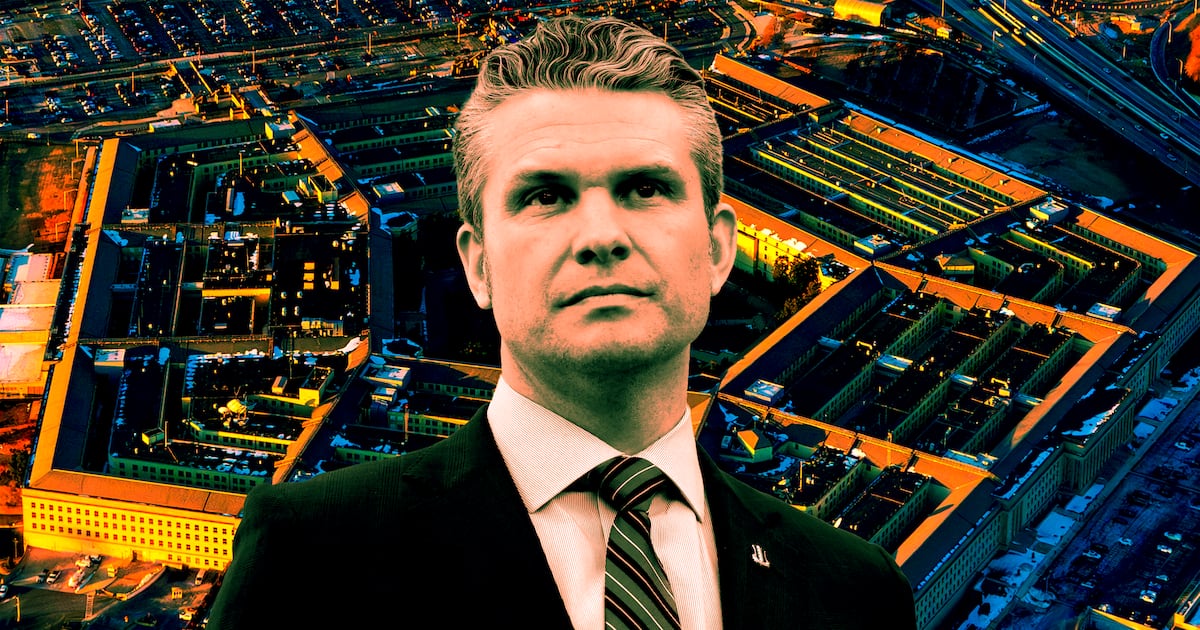On a recent December evening, from the middle of ISIS-occupied territory in Mosul, Saad spoke quietly into his mobile. The Iraqi army had just been mauled at the nearby Salam hospital in a fierce ISIS ambush, and the insurgents were prowling the streets of Saad’s neighborhood. “They are moving around the area in their suicide vests,” he told The Daily Beast over the phone in a hushed voice.
He lives adjacent to the Wahda district on the east bank of the Tigris river, and has borne witness to the latest bout of fighting in the contest for the city.
Saad said he heard the gunfire and the detonation of a suicide bomber who blew himself up amid Iraqi soldiers, and he could see the top floor of the hospital ablaze after the Iraqi army retreated.
Iraqi security forces have been slowly pushing into the eastern part of Mosul since November 1, liberating a series of neighborhoods on the outskirts. On December 6, the Iraqi 9th Armored Division tried a new approach, dashing through several areas in an attempt to seize Wahda, barely a mile from the first of five bridges that connect the two halves of the city.
The attack sparked a withering ISIS backlash, and brought the war to Saad’s doorstep.
Until then, he had experienced the deadly battle only through its side effects: Food and fuel prices skyrocketed after advances by Iraqi forces cut off a main supply route from Syria and the Mosul bridges were bombed by the U.S.-led coalition. The fighting interrupted the electricity and water supplies, and Saad’s family resorted to digging for ground water.
Residents in areas still under ISIS control also have to fear the group’s increasing paranoia.
To prevent Moslawis from passing information to the military, the insurgents now kill everyone caught in possession of a phone, inhabitants tell The Daily Beast.
Hamad, who lives in the Al Quds area near the eastern fringes of the city, saw jihadists suddenly turn up at a neighbor’s house, where they found several mobile phones. They shot three of the occupants immediately.
“You can’t trust anyone,” says Hamad, who suspects that ISIS had been tipped off by supporters of the group. (Like all the men interviewed in this piece, Hamad is going by a pseudonym to protect him from ISIS retribution.) Fortunately, the insurgents have had little time to focus on the population since they are battling the Iraqi military in the city, and house searches have become less common.
In the eastern part of Mosul, medical treatment is increasingly hard to come by.
“Daesh [ISIS] has taken the medicine from the hospitals, and is using it for its fighters in field hospitals they have set up. They don’t care what happens to the civilians,” says Ahmed, who lives with his family in the embattled Faselea neigbhorhood near the eastern outskirts. The family has stocked up diabetes medicine for Ahmed’s father and hope it will not run out before their area is liberated.
“If you want to go to a doctor, you have to go to the other side of the river. But that’s no longer possible, as all of the bridges have been bombed,” says Hamad.
The insurgents have long cracked down brutally on any form of resistance by the inhabitants, and have conducted thorough house-to-house searches for weapons to forestall an armed uprising. But, fed up by the jihadist’s cruel regime and the increasing deprivations heaped on them, Mosul’s inhabitants revel in small acts of defiance.
“One of the foreign fighters asked us for directions to the front line, and we sent him the wrong way,” recalls Ahmed gleefully.
Defying ISIS can carry a bigger danger. When the insurgents pulled out of the Masaref neighborhood late in November, they called on the population to follow them deeper into the city, says Mohammed, a local school teacher.
“Daesh asked the people to leave their houses and retreat with them, but they refused. The people put their lives at risk by refusing,” he says. Mohammed’s neighborhood is now controlled by the elite Iraqi government counterterrorism units that have spearheaded the assault into the city. But his family is still unable to leave the house, as ISIS maintains a constant barrage of mortar fire that pours into Masaref.
Thoroughtly fanaticized by their hardline ideology and cynically seeking to use Mosul’s population as human shields, the jihadists fire indiscriminately into the areas no longer under their control, and pick off civilians crossing the front lines.
“The [ISIS] imams in the mosques say all people in liberated areas have become infidels, and that it’s allowed to kill them,” says Hamad.
Hamad’s neighborhood, Al Quds, is adjacent to Karama, which is already largely controlled by Iraqi forces. Residents near the front lines are terrified about getting caught up in the crossfire. The Iraqi army and the coalition have made limited artillery and air strikes in the battle for Mosul—proving that the jihadists’ human shield tactics is effective—but civilians do fall victim to government fire, says Hamad.
“Yesterday there was a big fight, but the bombardment didn’t hit Daesh. It hit locals, and more than forty people died,” he claims.
Some Moslawis are surprised that the military is not advancing more swiftly.
“I don’t see a lot of Daesh fighters in my area. I don’t know why the liberation is so slow,” says Hamad.
ISIS relies on suicide car bombs and snipers, and only has around 25 fighters in each neighborhood, according to Hamad. These cells act autonomously of each other, holding the ground at all cost without shifting to other parts of the front.
“If the military takes an area, the Daesh fighters there don’t retreat. But they don’t help groups in other districts either,” he says.
As the response to the army’s ill-fated assault on Salam hospital demonstrated, ISIS maintains enough mobile reserves to flood an area with its fighters if needed. But many residents suspect that the insurgents are only mounting a skeleton defense in the eastern part of the city, and that resistance on the west bank of the Tigris will be stiffer still. The Iraqi army has yet to reach the city limits on that side of the river, and residents say that ISIS has constructed a strong defensive belt around the historic city centre.
“They are preparing their defenses on other side of river, more than on this side of river,” says Saad.
Many of the neighborhoods in and around the city center are poor, and popular support for ISIS has remained high. Unlike the more recently built districts on the east side of the river, the urban landscape in these older districts is dominated by dense housing and narrow streets. It in areas like these—Mansour, Mosuljadida, Old Baghdad Road, Alrasala—that the insurgents will concentrate their defense, Saad predicts.
“This will be where the main battle will be. It’s filled with their fighters,” he says.
Many of the foreign fighters, who are regarded as more fanatical and competent than the local recruits, have already crossed the river to save themselves for the final showdown.
As they wait, life around them is continuing much like it has since ISIS took control of the city in the summer of 2014.
The terror group’s religious police, the Hisbah, continue to make the rounds on the west bank of the Tigris. “There are no signs of fighting there,” says Saad. “The Hisbah are still collecting taxes, and are forcing people to keep their beards long.”






